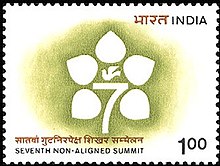India and the Non-Aligned Movement
For India, the concept of non-alignment began as a policy of non-participation in the military affairs of a bipolar world and in the context of colonialism aimed towards optimum involvement through multi-polar participation towards peace and security.
[2] Non-aligned countries, however, rarely attained the freedom of judgement they desired and their actual behaviour towards the movement's objectives, such as social justice and human rights, were unfulfilled in many cases.
The country's place in national diplomacy, its significant size and its economic growth turned India into one of the leaders of the Non-Aligned Movement.
[14] In 1946, Nehru, as a part of the cabinet of the Interim Government of India, said during a radio broadcast; "we propose, as far as possible, to keep away from the power politics of groups, aligned against one another, which have led in the past to world wars and which may again lead to disasters on an even vaster scale".
[15] In 1948, he made a speech to the Constituent Assembly (Legislative) titled "We Lead Ourselves" in which he said the world was going through a phase in which the foreign policies of major powers had "miserably failed".
[19] The term 'Non-Alignment' was used for the first time in 1950 at the United Nations when both India and Socialist Federal Republic of Yugoslavia rejected alignment with any side in the Korean War.
Nehru's concept of non-alignment brought India considerable international prestige among newly independent states that shared its concerns about the military confrontation between the superpowers and the influence of the former colonial powers.
By laying the foundation stone of 'Non-Alignment Movement', India was able to establish a significant role for itself as a leader of the newly independent world and in the multilateral organisations like the UN.
[24] The Non-Aligned Movement had its origins in the 1947 Asian Relations Meeting in New Delhi and the 1955 Asian-African Conference in Bandung, Indonesia.
In the 1960s and 1970s, India concentrated on internal problems and bilateral relations but retained membership in the increasingly factionalised and radicalised movement.
During the contentious 1979 Havana summit, India worked with moderate nations to reject Cuban President Fidel Castro's proposition that "socialism" was the "natural ally" of non-alignment.
[27] The response of non-aligned nations to the Indo-Pakistan conflicts revealed insights into their views towards self determination, issues of secession, the use of force in boundary disputes, armed intervention, external support in liberation struggles, human rights and genocide.
[13] In July 2020, India's External Affairs Minister Subrahmanyam Jaishankar said during an interview; "non-alignment was a term of a particular era and a particular, shall I say, geopolitical landscape".


